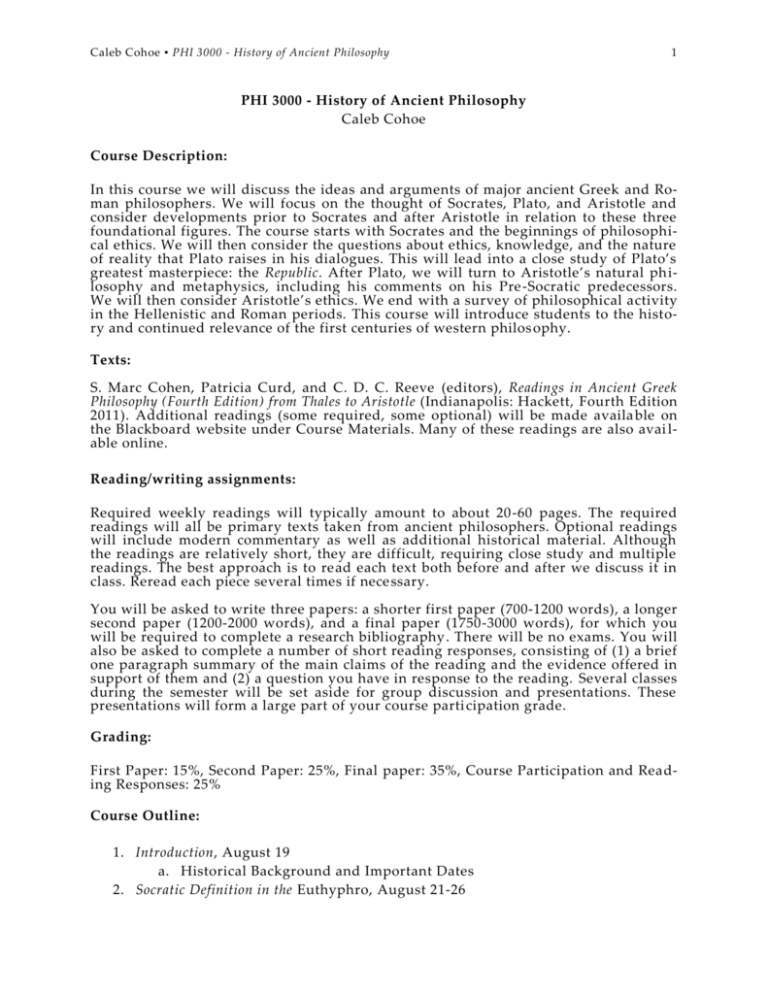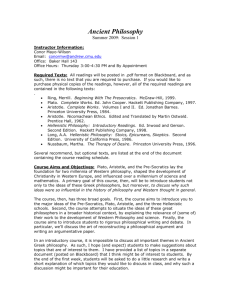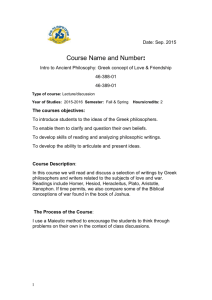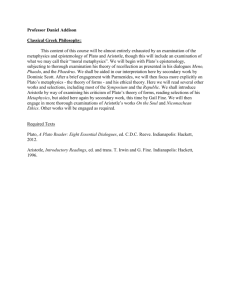ancient-syllabus-F13..
advertisement

Caleb Cohoe ▪ PHI 3000 - History of Ancient Philosophy 1 PHI 3000 - History of Ancient Philosophy Caleb Cohoe Course Description: In this course we will discuss the ideas and arguments of major ancient Greek and Roman philosophers. We will focus on the thought of Socrates, Plato, and Aristotle and consider developments prior to Socrates and after Aristotle in relation to these three foundational figures. The course starts with Socrates and the beginnings of philosophical ethics. We will then consider the questions about ethics, knowledge, and the nature of reality that Plato raises in his dialogues. This will lead into a close study of Plato’s greatest masterpiece: the Republic. After Plato, we will turn to Aristotle’s natural ph ilosophy and metaphysics, including his comments on his Pre -Socratic predecessors. We will then consider Aristotle’s ethics. We end with a survey of philosophical activity in the Hellenistic and Roman periods. This course will introduce students to the history and continued relevance of the first centuries of western philos ophy. Texts: S. Marc Cohen, Patricia Curd, and C. D. C. Reeve (editors), Readings in Ancient Greek Philosophy (Fourth Edition) from Thales to Aristotle (Indianapolis: Hackett, Fourth Edition 2011). Additional readings (some required, some optional) will be made availa ble on the Blackboard website under Course Materials. Many of these readings are also avai lable online. Reading/writing assignments: Required weekly readings will typically amount to about 20 -60 pages. The required readings will all be primary texts taken from ancient philosophers. Optional readings will include modern commentary as well as additional historical material. Although the readings are relatively short, they are difficult, requiring close study and multiple readings. The best approach is to read each text both before and after we discuss it in class. Reread each piece several times if nece ssary. You will be asked to write three papers: a shorter first paper (700-1200 words), a longer second paper (1200-2000 words), and a final paper (1750-3000 words), for which you will be required to complete a research bibliography. There will be no exams. You will also be asked to complete a number of short reading responses, co nsisting of (1) a brief one paragraph summary of the main claims of the reading and the evidence offered in support of them and (2) a question you have in response to the reading. Several classes during the semester will be set aside for group discussion and presentations. These presentations will form a large part of your course parti cipation grade. Grading: First Paper: 15%, Second Paper: 25%, Final paper: 35%, Course Participation and Reading Responses: 25% Course Outline: 1. Introduction, August 19 a. Historical Background and Important Dates 2. Socratic Definition in the Euthyphro, August 21-26 Caleb Cohoe ▪ PHI 3000 - History of Ancient Philosophy 2 a. Plato, Euthyphro 3. Socrates’ Trial and Conviction, August 28 a. Plato, Apology 4. No One Does Evil Willingly, September 4-9 a. Plato, Protagoras, 348c-362a 5. Learning as Recollecting, September 11-16 a. Plato, Meno 6. The Phaedo’s Introduction of the Forms and Argument for the Immortality of the Soul, September 16-18 a. Plato, Phaedo 7. Paper One Due September 23 8. Plato’s Republic, September 23-October 7 a. Why Be Moral? (Books One to Two) b. Justice in City and Soul (Books Two to Four) c. Parts of the Soul (Book Four) d. Theory of Forms: Line, Sun, and Cave (Books Six and Seven, 503b-518b) 9. Aristotle’s Natural Philosophy and Metaphysics , October 9-November 6 a. Aristotle’s Categories (Categories and De Interpretatione 1 and 9) b. Aristotle’s Theory of Change (Physics I 1, 7-9; Selections from Parmenides and the Atomists) c. On Nature and the Four Causes (Physics II 1-3, 7-9; Selections from the Pre-Socratics) d. On Matter and Form (Metaphysics I 1-3, VII 1-4, 17) e. On the Soul (De Anima II 1-4) f. Perception and Understanding (De Anima II 5-6, 12; III 4-5) g. God and the Order of Reality (Metaphysics XII 6-9) 10. Paper Two Due November 13 11. Aristotle’s Ethics, November 11-November 20 a. The Human Good and Happiness (Nicomachean Ethics I 1-5) b. The Human Work Argument (Nicomachean Ethics I 7-9, 13) c. Aristotle on Lack of Control (Nicomachean Ethics VII 1-3) d. Aristotle on Contemplation and Happiness ((Nicomachean Ethics X 6-8) 12. Later Greek and Roman Philosophy, November 20-December 4 a. Epicurean Ethics and Natural Philosophy (Lucretius, De Rerum Natura, Selections) b. Stoic Ethics and Natural Philosophy (Epictetus, Handbook, Selections) c. The Impotence of Reason: Pyrhonnian Skepticism (Sextus Empiricus, Outlines I, Selections) d. Augustine on Good, Evil, and Happiness (Confessions, Selections, City of God, XIX and XX, Selections) 13. Research Bibliography Due December 2 14. Final Paper Due December 9 Caleb Cohoe ▪ PHI 3000 - History of Ancient Philosophy 3 Writing Center: The Writing Center, located in King Center 415, can help you with any aspect of your writing, from generating ideas to supporting your arguments to organizing to editing for style. For the current schedule or to make an appointment, visit the Writing Ce nter’s website at https://www.msudenver.edu/writectr/ or call 303-556-6070. Withdrawal Policy: Students will be expected to know and observe the Metro State regulations regarding Withdrawal (W). To receive a W, a student needs to voluntarily withdraw before the withdrawal deadline. Effective fall 2013 the NC grade notation will no longer be applied to academic records. For information on this and other academic policy changes, please see http://www.msudenver.edu/advising/student/academicpolicies/ Students can drop a class online at MetroConnect through the end of the tenth week of the semester. Proportional time frames are applied for part-of-term courses, weekend courses, workshops and summer terms. These deadlines are available from the O ffice of the Registrar or the Office of Student Accounts. After the end of the tenth week of the semester, students cannot receive a W. The “I” notation may be used during this period, provided the conditions needed for an “I” are met (see Student Handbook). Students who have questions about tuition and fees r efund deadline should contact the Office of Student Accounts at 303 -556-6188. Class Attendance on Religious Holidays: Students at Metro State who, because of their sincerely held religious beliefs, are unable to attend classes, take examinations, participate in gra ded activities or submit graded assignments on particular days shall without penalty be excused from such classes and be given a meaningful opportunity to make up such examinations and graded activities or assignments provided that advance written notice t hat the student will be absent for religious reasons is given to the faculty members during the first two weeks of the semester. Nothing in paragraph 1 of this policy shall require Metro State faculty members to reschedule classes, repeat lectures or other ungraded activities or provide ungraded individualized instruction solely for the benefits of students, who for religious reasons, are unable to attend regularly scheduled classes or activities. However, presentations, critiques, conferences and similar activities involving students shall be scheduled to avoid conflicts with such students’ religious observances or holidays, provided that reasonable advance notice of scheduling conflicts is given to faculty members. Because classroom attendance and participation is an important aspect of learning, Metro State students should not register for courses if regularly scheduled classes or activities ro utinely conflict with their observances or holidays. Any MSCD student who believes that a Metro State faculty member has violated this policy is entitled to seek relief under Section V of the Metro State Equal Opportunity Grievance Procedure. Americans with Disabilities Act Statement: Caleb Cohoe ▪ PHI 3000 - History of Ancient Philosophy 4 The Metropolitan State College of Denver is committed to making reasonable accommodations to assist individuals with disabilities in reaching their academic p otential. If you have a disability which may impact your performance, attendance, or grades in this class and are requesting accommodations, then you must first register with the Access Center, located in the Auraria Library, Suite 116, 303 -556-8387. The Access Center is the designated department responsible for coordinating a ccommodations and services for students with disabilities. Accommodations will not be granted prior to my receipt of your faculty notification letter from the Access Center. Please note that accommodations are never provided retroactively (i.e., prior to the r eceipt of your faculty notification letter.) Once I am in receipt of your official Access Center faculty notification letter, I would be happy to meet with you to discuss your accommodations. All discussions will remain confidential. Further information is available by visiting the Access center website http://www.msudenver.edu/access/. Academic Dishonesty: Academic Dishonest is a serious offense at the College because it diminishes the qual ity of scholarship and the learning experience for everyone on campus. An act of ac ademic dishonesty may lead to sanctions including a reduction in grade, probation , suspension, or expulsion. Academic dishonesty includes cheating, fabrication, plagi arism, submitting the same paper or work for more than one class, and facilitating ac ademic dishonesty. For definitions and more information, see the Student Handbook which is available online through Metro-Connect.








